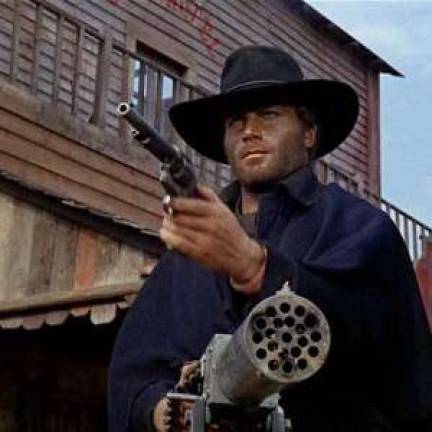Spaghetti Westerns, Film Forum's current retrospective (now through June 21) may be the most important series that redoubtable, unpredictable New York institution has ever shown. This extensive three-week, 26-film survey of the 1960s Italian film genre reexamines its history but most compellingly asks the question "Do we watch movies as adults or as children?" That crucial question is raised by no less an authority than Alex Cox, director of Repo Man, who confers approval on the genre in his new book 10,000 Ways to Die: A Director's Take on the Spaghetti Western. It's an affectionate compendium of the genre's peculiarity: Spaghetti westerns were an exotic refashioning of Hollywood's most exportable narrative form that occurred at the precise moment popular culture reflected certain temperamental upheaval. Cox's commendation means something. As cinema's best representative of the British Punk-era ethos, Cox is attuned to the social significance of popular art; his perspective restores principles that have been lost over film culture's past two decades when genre scrutiny gave way to genre hedonism. If for no other reason, Film Forum's retro is a significant intervention in the heretofore unquestioned reign of Quentin Tarantino's cinematic decadence?an insidious culture-wide perversion significantly derived from his undigested consumption and imitation of the violence and hysteria in Spaghetti Westerns (as well as Blaxploitation). QT's infamous, sadistic moment of cutting off a man's ear in Reservoir Dogs originated in Sergio Carbucci's 1966 Django, a Western about a Civil War vet who opposes assorted marauders. (Django Unleashed will be the title of QT's upcoming flick combining Spaghetti and Blaxploitation. Children throughout the Internet express pants-wetting anticipation.) Cox's examination of the Spaghetti Western pinpoints the genre's immature appeal. This is essential to understanding its influence on the aberrations of American pop culture several decades later. Cox importantly fesses up to affections that QT confuses with cinephilia. In a 2009 Financial Times article, Cox recognized his love for Spaghetti Westerns as "mad-boy stuff." He wrote "Sure, I could appreciate a film such as Tony Richardson's Loneliness of the Long-Distance Runner (1962) with its northern anti-hero who refused to play by the rules. But the world I knew best [from boys school education] had more in common with the psychos and testosterone freaks depicted in the new Italian" films. It is the berserk reinterpretation of American social and political history in these films that makes the Spaghetti Western an eccentric moral testing ground. (Surely the moniker connects to the giallo?melding Italy's outre horror genre with American horse opera.) The films have little to do with the actual historical events sometimes obliquely referenced; they are, instead, expressions of a prevailing, obviously European post-WWII pessimism. To read the full article at City Arts [click here. ](http://cityarts.info/2012/06/14/spaghetti-westerns-the-birth-of-cynicism/)

